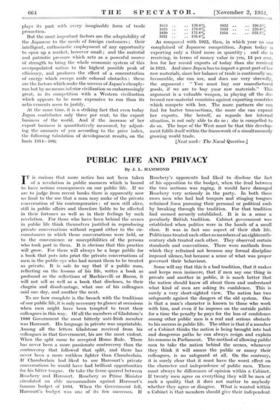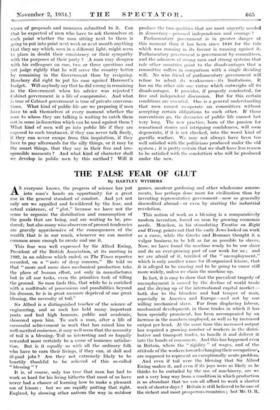PUBLIC LIFE AND PRIVACY
By J. L. HAMMOND IT is curious that more notice has not been taken of a revolution in public manners which is bound to have serious consequences on our public life. If we are to judge from recent books there is apparently now no limit to the use that a man may make of the private conversation of his contemporaries : of men still alive, still in public affairs and therefore liable to be affected in their fortunes as well as in their feelings by such revelation. For those who have been behind the scenes in public life think themselves justified in reproducing private conversations without regard either to the cir- cumstances in which those conversations were held, or to the convenience or susceptibilities of the persons who took part in them. It is obvious that this practice will grow. For there will always be a large public for a book that puts into print the private conversations of men in the public eye who had meant them to be treated as private. It is safe to say that if a public man, reflecting on the lessons of his life, writes a book as profound as the reflections of Machiavelli or Bacon, it will not sell as well as a book that discloses, to their chagrin and disadvantage, what one of his colleagues said one day, and another the next.
To see how complete is the breach with the traditions of our public life, it is only necessary to glance at occasions when men might have been tempted to treat their colleagues in this way. Of all the members of Gladstone's 1880 Government the most bitterly anti-Irish member was Harcourt. His language in private was unprintable. Among all the letters Gladstone received from his colleagues in that Government, his are the most violent: When the split came he accepted Home Rule. There has never been a more passionate controversy than the controversy that followed that split, and there has never been a more ruthless fighter than Chamberlain. If Chamberlain had liked to use Harcourt's private conversations he would have had brilliant opportunities for his bitter tongue. Or take the fierce quarrel between Rosebery and Harcourt. Rosebery as Prime Minister circulated an able memorandum against Harcourt's famous budget of 1894. When the Government fell, Harcourt's budget • was one of its few "successes. If Rosebery's opponents had liked to disclose the fact of his opposition to the budget, when the feud between the two sections was raging, it would have damaged Rosebery very seriously in the party. In both these cases men who had bad tempers and stinging tongues refrained from pursuing their personal or political ends by breaking through the tradition. For that tradition had seemed securely established. It is in a sense a peculiarly British tradition. Cabinet governnient was established when politics were in the hands of a small class. It was in fact one aspect of their club life. Politicians treated each other as members of an eighteenth- century club treated each other. They observed certain standards and conventions. There were methods from which they refrained not because any formal discipline imposed silence, but because a sense of what was proper governed their behaviour.
Some will say that this is a bad tradition, that it makes and keeps men insincere, that if men say one thing in private and another in public, it is much better that the nation should know all about them and understand what kind of men are asking its confidence. This is surely a very short-sighted view. The nation has two safeguards against the dangers of the old system. One is that a man's character is known to those who work with him, and even if he imposes on the outside public for a time the penalty he pays for the loss of confidence among other public men is a real and serious obstacle to his success in public life. The other is that if a member of a Cabinet thinks the nation is being brought into bad and dangerous paths he can always, resign and explain his reasons in Parliament. The method of allowing public men to take the nation behind the scenes, whenever they think it will amuse the public or annoy their colleagues, is no safeguard at all. On the contrary, it is surely clear that it must have the worst effect on the character and independence of public men. There must always be differences of opinion within a Cabinet. If twenty men agree on everything they will be men of such a quality that it does not matter to anybody whether they agree or disagree. What is wanted within a Cabinet is that members should give their independent views of proposals and measures submitted to it. Can that be expected of men who have to ask themselves at each point whether the man sitting next to them is going to put into print next week or next month anything that they say which, seen in a different light, might seem to place in doubt their consistency or their sympathy with the purposes of their party ? A man may disagree with his colleagues on one, two or three questions and yet judge rightly that he will serve the country better by remaining in the Government than by resigning. Rosebery did right to put his case against Harcourt's budget; Will anybody say that he did wrong in remaining in the Government when his advice was rejected ? Cabinet government is a life of compromise. And what is true of Cabinet government is true of private conversa- tions. What kind of public life are we preparing if men have to ask themselves at every- moment whether the man to whom they are talking is waiting to catch them out in some indiscretion which can be used against them ? What kind of men will go into public life if they are exposed to such treatment, if they can never talk freely, if they can never escape from this inquisition, if they have to pay afterwards for the silly things, or it may be the smart things, that they say in their free and irre- sponsible moments ? And what kind of character shall we develop in public men by this method ? Will it produce the two qualities that are most urgently needed in democracy—personal independence and courage ?
• Parliamentary government is in greater danger at this moment than it has been since 1848 for the tide which was running in its favour is running against it. Parliamentary government is government by committees, and the admirers of strong men and strong systems that rule other countries point to the disadvantages that a Committee suffers in comparison with a single deciding will. No wise friend of parliamentary government will refuse to admit its weaknesses—its limitations. It has on the other side one virtue which outweighs all its disadvantages. It provides, if properly conducted, for free and independent discussion. But for this certain conditions are essential. One is a general understanding that men cannot co-operate on committees without accepting certain obligations to each other. If those conventions go, the decencies of public life cannot last very long. The new practice, born of the passion for sensational stories and intriguing confidences, will soon degenerate, if it is not checked, into the worst kind of guerilla warfare. We may not always have been too well satisfied with the politicians produced under the old system ; it is pretty certain that we shall have less reason to be satisfied with the condottieri who will be produced under the new.















































 Previous page
Previous page